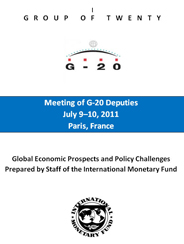Group of Twenty -- Meeting of G-20 Deputies
IMF Note on Global Economic Prospects and Policy Challenges
July 9–10, 2011, Paris, France
About the Executive Summary
The Following executive summary is from a note by the Staff of the IMF prepared for the July 9–10, 2011 meeting of the Group of Twenty Deputies in Paris, France
Read the Full text ![]()
Executive Summary
The multi-speed recovery continues.
- Growth in the first quarter of 2011 was broadly in line with Staff expectations. Activity in most advanced economies has slowed in the second quarter, but the slowdown is expected to be temporary.
- Overall, the outlook for global growth in 2011–12 remains broadly unchanged compared with the April 2011 World Economic Outlook, although with considerable differences among economies.
- Growth is expected to remain sluggish in advanced economies faced with household, fiscal, and financial sector balance sheet problems, but strong in many emerging and developing economies.
Downside risks have risen.
- Concern about debt sustainability and support for adjustment efforts in Europe’s periphery is leading to increased market worries about potential contagion. Risks from the lack of credible medium-term fiscal plans are also elevated in other advanced countries, notably the United States, in which a deadline for raising the debt ceiling looms large, and Japan.
- By contrast, overheating pressures in many emerging and developing economies are intensifying, as exhibited by rising inflation and rapid credit growth.
- Low interest rates in major advanced economies continue to push investors into riskier assets in a search for higher yield, potentially generating financial imbalances, particularly in some emerging markets.
Policy initiatives are needed to increase robustness and secure the recovery.
- The risks of not resolving the Greek crisis are severe. A greater sense of urgency is needed to address the crisis and reduce the risks of contagion.
- Progress on financial sector repair and reform has been too slow, and policy initiatives are urgently needed to make financial systems resilient to new systemic shocks.
- Advanced G-20 economies need to put in place credible medium-term fiscal consolidation that balances short-run growth fragility with fiscal sustainability. Monetary policy should support fiscal adjustment and stay accommodative where there is economic slack.
- In emerging G-20 economies, more rapid macroeconomic policy tightening and demand rebalancing is needed in some cases. Pragmatic use of macroprudential tools may be needed to manage large capital inflows.

